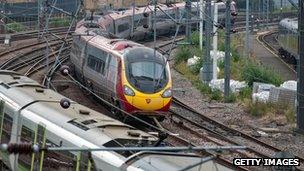Network Rail faces action over late and cancelled trains
- Published

Network Rail missed all its punctuality targets for England and Wales
Network Rail missed all its punctuality targets for England and Wales last year, rail regulator figures reveal.
Some 361,000 train services in London and the South East and 70,500 national journeys were cancelled or late.
The Office of Rail Regulation (ORR) figures come after the company's bosses were awarded bonuses equivalent to 17% of their salaries.
Virgin Trains says it will take action against Network Rail, claiming a breach of contract over punctuality.
In its assessment of Network Rail's performance in 2012/13, the ORR said 91% of trains ran on time in London and south east England - 1.7% behind the regulatory target for the year.
The ORR added: "To put this in context, this means 361,000 London and South East train services were either cancelled or more than five minutes late over the year."
On long-distance services, the on-time figure was 87% - 4.5% below target for the year.
Olympic success
The regulator said that translated as 70,500 long-distance train services either cancelled or more than 10 minutes late over the year.
The regulator praised Network Rail's performance in Scotland, where punctuality improved.
It also said there had been continued growth on the rail network and that Network Rail had achieved "real successes in meeting the challenges of the 2012 London Olympics".
The ORR said it was investigating whether Network Rail did "everything reasonably practicable" to ensure its services ran on time.
Virgin Trains said it was "preparing enforcement action to bring punctuality improvements, following sustained poor performance by Network Rail, which we believe is a breach of contract and has deterred some customers from travelling and damaged our business".
The case will be heard by a rail industry body - the Access Disputes Resolution Committee.
'Tangible improvements'
Virgin claimed that more than 70% of its delays were down to Network Rail infrastructure problems and 15% caused by Virgin Trains problems.
Virgin Rail Group chief executive Tony Collins said: "Any penalties levied on NR should be in the form of tangible improvements that customers benefit from.
"There is really no benefit to Network Rail, customers or Virgin Rail Group in having money leave the industry."
Rail users' watchdog Passenger Focus said the results were "disappointing".
Chief executive Anthony Smith said: "Passengers will be disappointed to see that Network Rail is failing to deliver on their top priority - performance.
"Passenger needs should run through all planning, spending and bonus schemes.
"Record numbers of passengers are now using the railway and they tell us that what they want is reliable, frequent services with space to sit or stand."
Last month it was announced that Network Rail's top five executives would be awarded bonuses totalling £350,000 - equivalent to 17% of their salaries.
That included £99,082 for chief executive David Higgins on top of his £577,000 salary.
The bosses could have received up to 60% of their salary - but the bonuses were cut because of missed punctuality targets.
Bob Crow, general secretary of the RMT transport union, said: "The truth is that rail performance is being hammered by cuts to maintenance and staffing demanded by the ORR themselves with the result that we are seeing frequent cracked rails and overhead line failures all piling on the passenger delays.
"In the mad world of rail privatisation, Network Rail now faces fines of over £50m which will have to come out of the maintenance budget, creating more breakdowns and delays. That's a ludicrous way to run our railways."
'Unprecedented investment'
A Network Rail spokesman said: "The challenge we have faced over the last year, and will continue to face in the years ahead, is one of success - more people wanting to use more trains, more of the time.
"Over the last 12 months we have invested an unprecedented amount in growing and expanding the rail network through over 2,000 projects nationwide.
"However, the economic times in which we live mean that alongside delivering new capacity we need to keep a constant drive for improved efficiency.
"Our overall financial performance remains strong and we are on track to deliver over £5bn of cost savings for the five years to 2014.
"Building capacity and driving efficiency while maintaining performance at today's historical high levels lie at the heart of our bid for funding for the next five-year control period and the future of the company."
A spokesman added that the company is "working closely" with Virgin to fix infrastructure problems on the West Coast Main Line.
- Published6 June 2013
- Published29 May 2013
- Published8 January 2013